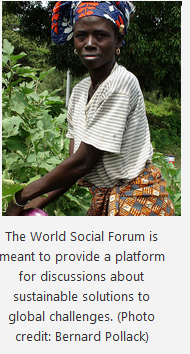 The World Social Forum (WSF) is taking place this week in Dakar, Senegal, bringing together 75,000 people from 132 countries to advocate for social change. In light of sky rocketing food prices, high unemployment, and growing concerns about climate change worldwide, the Forum is meant to provide a platform for discussions about sustainable solutions to these global challenges—as well as to provide a counter-event to the World Economic Forum, which took place in Davos, Switzerland two weeks ago.
The World Social Forum (WSF) is taking place this week in Dakar, Senegal, bringing together 75,000 people from 132 countries to advocate for social change. In light of sky rocketing food prices, high unemployment, and growing concerns about climate change worldwide, the Forum is meant to provide a platform for discussions about sustainable solutions to these global challenges—as well as to provide a counter-event to the World Economic Forum, which took place in Davos, Switzerland two weeks ago.
The WSF stresses improved global South-South relations and increased participation from those most affected by global policies, as a means of improving global democracy. One proposed solution is the establishment of an elected world parliament called United Nation’s Parliamentary Assembly.
“The people of the world want to have a say in the affairs that affect them,” said Manuel Manonelles, director of UBUNTU-World Forum of Civil Society Networks. “As more and more important decisions are taken at the global level, this aspiration cannot stop at national borders. Global democratic representation is needed. The goal is to create a directly elected assembly.”
Another issue addressed at the forum was immigration and the need for a world without borders. Europe, for example, continues to receive a great number of immigrants—both legal and illegal— from Northern Africa. At panel discussions, many NGOs and several left-wing politicians warned that hard-line policies, such as the threat of deportation or attempts to marginalize foreign workers, are not enough to slow down the population shift. And instead, these policies only serve to make life more difficult for those who do make it across borders.
Former Italian Prime Minister, Massimo D’Alema also reminded participants that immigrants are essential for the European labor force. “Europe will need more than 30 million immigrants within the next 30 years if the difference between the active and passive [older] population is to remain in balance,” D’Alema said.
D’Alema stated that as long as there is a gap in living standards between industrialized and developing countries, illegal migration would be impossible to control. Immigration itself is not the problem, but instead it is the inequalities between developing and developed countries.
“We need sustainable development which offers the young generation prospects so they don’t have to risk their lives in the search for a more settled future,” D’Alema said.
To read about agriculture at the World Economic Forum in Davos, Switzerland two weeks ago, see: Bringing Agriculture to the Negotiating Table at the World Economic Forum in Davos.
Guest Post By Supriya Kumar

Danielle Nierenberg, an expert on livestock and sustainability, currently serves as Project Director of State of World 2011 for the Worldwatch Institute, a Washington, DC-based environmental think tank. Her knowledge of factory farming and its global spread and sustainable agriculture has been cited widely in the New York Times Magazine, the International Herald Tribune, the Washington Post, and
other publications.
Danielle worked for two years as a Peace Corps volunteer in the Dominican Republic. She is currently traveling across Africa looking at innovations that are working to alleviate hunger and poverty and blogging everyday at Worldwatch Institute’s Nourishing the Planet. She has a regular column with the Mail & Guardian, the Kansas City Star, and the Huffington Post and her writing was been featured in newspapers across Africa including the Cape Town Argus, the Zambia Daily Mail, Coast Week (Kenya), and other African publications. She holds an M.S. in agriculture, food, and environment from Tufts University and a B.A. in environmental policy from Monmouth College.








